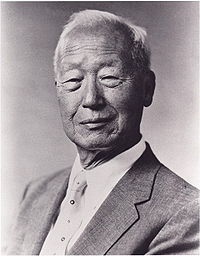Why were the Japanese hated like that? What had the Japanese done to foreign people? You wouldn't reach the answer. As much as you learn history, you would become confused to know the justice of Japan.
Originally, Japan had made an effort to become the bravest, most moral and most-liked nation in the world since the Meiji Restoration. It was also the intention of every single Japanese. The Imperial Army of Japan strictly kept the Convention respecting the laws and customs of war on land during the war, and they showed high-level restraint on every battlefield.
Even the crew of B29 bombers, which indiscriminately bombed Japan, were given instructions to willingly be taken in custody when they crashed, because the Japanese didn't commit violence against them. (Though some of the crew were executed, their military action was a clear violation of the convention and so this execution would be acceptable for anyone. They repeatedly performed indiscriminate massacres prohibited by international laws and the execution was thought to be commonsense.)
By the way, around the end of the war, the U.S. became far crueller and repeated barbarous actions. Why? I'll mention my private opinion.
The U.S. President at that time was Franklin Delano Roosevelt, FDR, who was well-known as a typical racist today. He apparently wanted to extirpate the Japanese people from this world. His words are being revealed bit by bit these days after a span of 60 years. FDR needed an excuse for waging war against Japan and hatched a plot forcing Japan to attack the U.S. first, and finally Japan was trapped by his plot. FDR continued the anti-Japan campaign or propaganda inducing Americans to hate the Japanese. FDR was really "mad" in the words of Herbert Hoover, the 31st U.S. President.
Additionally there was another person who fomented anti-Japan feeling in American society. It was Yi Syngman, who was also a madman. However, his appeal was very helpful for FDR who had to collect young men as soldiers. They were brainwashed that the Japanese people were the cruellest tribe in the world. Such propaganda would lead normal American young men to the massacres of the Japanese.
Before World War Two, colored people was regarded as MONKEYS. Japan's delegates insisted that racial discrimination should be thrown away in the Paris Peace Conference in 1919, but the proposition was rejected. "Equality" or "Democracy" was only for the white folks. However, the Japanese were exceptionally recognized as human on behalf of the continuous effort to catch up with the superpowers since the Meiji Restoration. In such circumstances, FDR had to collect and send his young men to the battlefield. Yi Syngman's anti-Japan propaganda which distorted and put down Japan must have been really convenient to FDR.
Link to Next
(Vocabulary)
Convention respecting the Laws and Customs of War on Land ハーグ陸戦条約
show/exercise restraint 慎重な態度をとる, 自制する
give instructions to 訓示する
convention [C] (国・政府間の) 協定, 協約
the European Convention on Human Rights ヨーロッパ人権条約
commit violence against sth <…>に暴行を加える, を害する, 損なう
barbarous〈人・行為が〉残虐極まりない =barbaric ;〈場所が〉未開の,〈人・行為が〉野蛮な;〈言葉が〉耳障りな
extirpate (formal) to completely destroy something that is unpleasant or unwanted
hatch [他] …を企てる, たくらむ
hatch a plot/a plan/an idea 陰謀[計画,考え]を企てる
in the words of sb ~の言葉を借りると
foment revolution/trouble/discord etc formal
to cause trouble and make people start fighting each other or opposing the government; [=]stir up:
[他](けなして・formal)〈戦争・暴動など〉 をあおる, 扇動する
Yi Syngman 李承晩
put sb down〈人〉をけなす, こけにする
以下、キチガイの写真2枚


なぜこのように日本は憎まれたのか? 日本が何をしたというのか? そもそも日本は、明治の開闢以降、世界のどこの国の民族よりも、勇敢で高潔で誰からも好かれる民族となろうと努力してきたのではなかったか。その精神は国民のひとりひとりにまで深く浸透し、日本軍はどの戦闘においてもハーグ陸戦条約を守り、無法な振る舞いは厳に慎んできた。あのB29でさえ、日本本土を空襲するに際して、墜落したら日本の捕虜になれ、日本人は乱暴な真似はしないから、と訓示がされている。(米軍兵士で処刑された者もいたが、これは戦うことのできない庶民に対する国際法で禁止された無差別殺戮を行ったからであり、むしろ処刑が当然。)ところが、大東亜戦争の後期になると、サイパン戦、沖縄戦等において、米軍は度重なる日本人への蛮行を働くようになる。なぜか。言わせてもらえば、それはフーバー元大統領から狂人と呼ばれたフランクリン・ルーズベルトと、同じく狂った朝鮮人李承晩による工作、プロパガンダのためだ。李承晩の日本を貶めるプロパガンダはルーズベルトにとって都合の良いものだった。アメリカの若者を集め戦場に送るのは悪い日本人を殺すためだと教え込んだに違いない。
Recent Comments